Beta Nicotinamide Adenine Dinucleotide: A Cornerstone of Cellular Metabolism
Explore the essential role of NAD+ in energy production, cellular repair, and metabolic regulation.
Get a Quote & SampleProduct Core Value

Beta Nicotinamide Adenine Dinucleotide
Beta Nicotinamide Adenine Dinucleotide (NAD+) is a vital coenzyme central to cellular metabolism. It plays a critical role in energy production through redox reactions, acting as both an oxidizing and reducing agent, which is fundamental for processes like glycolysis and oxidative phosphorylation. Beyond its redox functions, NAD+ is a key substrate for enzymes involved in DNA repair, gene expression, and cellular signaling pathways like ADP-ribosylation and sirtuin activity. Its availability and balance are crucial for maintaining cellular health, impacting aging and various disease states.
- Discover the essential role of NAD+ in cellular metabolism and how it facilitates energy transfer within cells.
- Learn about the NAD+ biosynthesis pathways and their significance for cellular vitality.
- Understand the impact of NAD+ clinical significance in the context of age-related diseases and metabolic disorders.
- Explore how ADP-ribosylation NAD+ contributes to crucial cellular repair mechanisms and signaling cascades.
Key Benefits
Enhanced Cellular Energy Production
Leverage the power of NAD+ in redox reactions to optimize cellular energy generation, supporting overall metabolic efficiency.
Support for Cellular Repair and Longevity
Understand the connection between NAD+ and sirtuins, highlighting their role in DNA repair and potentially influencing longevity.
Crucial Cofactor for Enzyme Activity
Benefit from NAD+'s role as a cofactor, enabling numerous enzymatic reactions vital for physiological functions and health.
Key Applications
Metabolic Regulation
NAD+ is indispensable for regulating various metabolic pathways, impacting how cells process nutrients and generate energy. Its balance is key to metabolic health.
Cellular Signaling
As a precursor and substrate, NAD+ is integral to cellular signaling cascades, including ADP-ribosylation, influencing cellular responses and functions.
Biochemical Research
Widely used in research, NAD+ serves as a critical reagent for studying enzyme kinetics, metabolic pathways, and the mechanisms of diseases.
Pharmaceutical Development
The critical roles of NAD+ in cellular processes make it a key target for drug development in areas such as aging, neurodegenerative diseases, and metabolic disorders.
